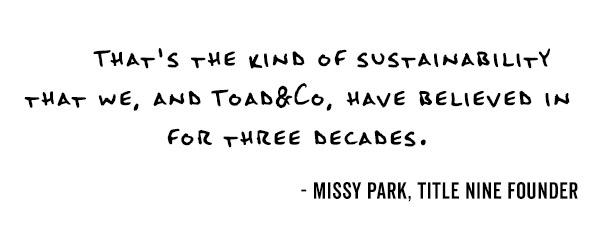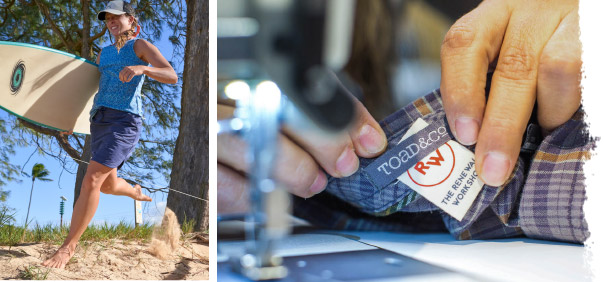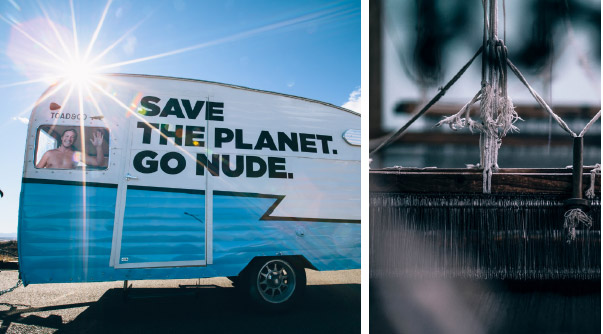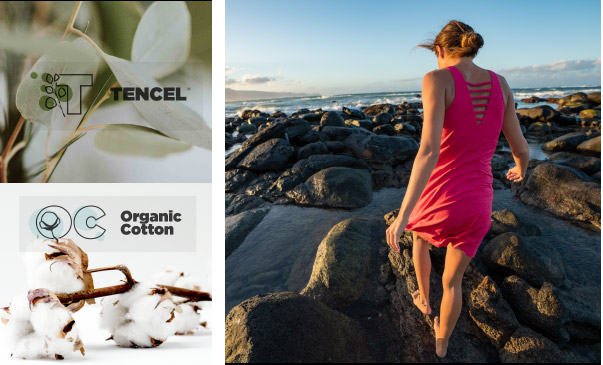Twenty years ago, our founder, Missy Park, met Toad&Co’s intrepid leader, Gordon Seabury. We dug their gear, they dug our mission. We were a company pushing women and girls to own, risk, and lead. Gordon was raising two daughters to do the same. Partnering up was pretty much a done deal.
As the years went by, our relationship grew, and the Toads started coaching us up on supply chain sustainability.
 One thing led to another, and together we set off on that winding, complicated, and sometimes straight-up gnarly path towards sustainability.
One thing led to another, and together we set off on that winding, complicated, and sometimes straight-up gnarly path towards sustainability.
Not the feel-good-but-make-no-tough-choices sustainability; the kind of sustainability that is full of hard choices (bye-bye soft, inexpensive acrylic) and hard work. But it’s the kind of hard work that will result in REAL progress—progress that will help protect our favorite places.
- New folks have been hired to teach both the Toads and T9ers about the impact of our fabric and fiber choices (Thank you, Ciara and Scott).
- Toad&Co has worked with long-time partners to improve manufacturing practices.
- And they’ve have added new partners (like Lenzing Modal® and bluesign®) who are helping them (and us) clean up some of the worst textile manufacturing processes. Together, we’re working towards eliminating the use of water-intensive crops (like conventional cotton), and toxic chemicals in our supply chains.
Instead of slapping a sustainability sticker on it and calling it done, Toad&Co has engaged in the deeply challenging work of supply chain reinvention, becoming an honest broker in a market riddled with a lot of false claims. And in the process, they are helping us clean up our own act as well. Sure, acrylic is inexpensive, but it’s also filled with chemicals and energy-intensive, so it’s been banned from the Toad library of fabrics.
Sure, acrylic is inexpensive, but it’s also filled with chemicals and energy-intensive, so it’s been banned from the Toad library of fabrics.
All of their poly fibers are recycled, made from 100% post-consumer plastic bottles— every Toad t-shirt uses about 9 recycled bottles.
Their cotton is 100% organic. (The conventional kind uses about 16% of the world’s pesticides.)
They use certified sustainable eucalyptus tree crops to create Tencel® (one of our all-time favorite performance fabrics).
Hemp makes the cut both because of it’s low environmental impact AND it’s amazing natural breathability.
Their sustainable stretch fabric doesn’t only replace spandex, it improves on it with an eco-friendly production process. All of this is the stuff of a 20-year-old “work marriage” at its best. Yep, there are squabbles and stand-offs. But mostly, there is deep respect, shared values and a commitment to learning topped off with a big dollop of don’t-take-it-too-seriously.
All of this is the stuff of a 20-year-old “work marriage” at its best. Yep, there are squabbles and stand-offs. But mostly, there is deep respect, shared values and a commitment to learning topped off with a big dollop of don’t-take-it-too-seriously.
Ready to get sustainable with us? Shop the whole Toad&Co collection from our travel-ready Aviatrix Tops to our super-popular Miraculous Skinny Pants.






Ditto for Nora Hussey’s question. In addition, isn’t sustainability insufficient unless you challenge the Northern hemisphere’s consumption of so much STUFF? Sustainability must also include reducing, reusing, and repairing. I know this takes time, but it’s not going to begin unless you think about it.
I’d love more details about what sustainability looks like. It’s great you have this partnership but it’s unclear how much you are actually doing. Seeing this more clearly would make me more interested in buying what looks like awesome gear!
Happy to see you are working on sustainability. I have never ordered from your catalogue because you do not give information about where the products are made. Imported? USA? Fair labor certified? More information and easier to find would be wonderful and would make me more inclined to purchase from you.
I still have my first T9 purchase; a pair of Horny Toad pants, that I drooled over as a poor college kid/athlete! They still fit and are in great condition for being 16 years old!
My collection of Toad gear has grown considerably since that first pair! Thanks T9 supplying this active woman with comfortable, durable and thoughtful clothing.
Love love love it!!! Good job!!!
That’s awesome! Love Toad&Co!
I agree with what you have written so far. Does your product get put together in the US? If so are the practices of that group green also? If the product is put together in another country do you monitor their practices?